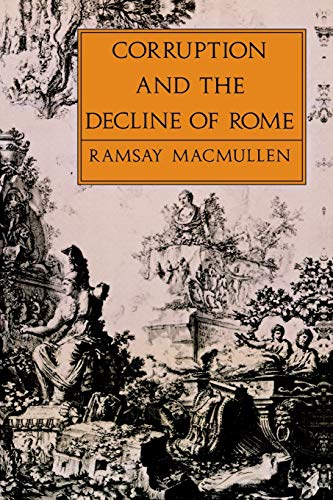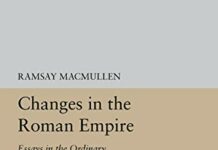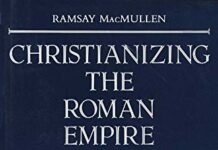
Ebook Info
- Published: 1990
- Number of pages: 331 pages
- Format: PDF
- File Size: 18.55 MB
- Authors: Ramsay MacMullen
Description
Prominent historian Ramsay MacMullen here offers a new perspective on the decline and fall of Rome. MacMullen argues that a key factor in Rome’s fall was the steady loss of focus and control over government as its aims were thwarted for private gain by high-ranking bureaucrats and military leaders. Written in an informal and lively style, his book―the culmination of years of research and thoughtful analysis―provides a fascinating, fresh line of investigation and shows convincingly that the decline of Rome was a gradual, insidious process rather than a climactic event. “An important book which will initiate a long debate. . . . What is new in MacMullen’s argument is not the existence of this corruption but its sheer scale and long-term global effects. . . . A vivid and frightening picture of how a great state and civilization, the construction of centuries of painfully acquired political culture, can be cripplingly undermined.”―Stephen Williams, History Today “A powerful account of the vices of late Roman society, which certainly helps us to understand some aspects of its partial fall.”―Jasper Griffin, New York Review of Books “All students of history must welcome this wide-ranging book from so eminent an authority. MacMullen’s knowledge of the ancient evidence is encyclopedic and his deceptively casual style and deliberate avoidance of technical terms make this an accessible and stimulating book for the general reader as well as for the specialist.”―Jill Harries, International History Review “MacMullen’s book is excellent: rich and learned in detail, lively in style, and in argument and insights highly stimulating.”―S. J. B. Barnish, Times Higher Education Supplement
User’s Reviews
Editorial Reviews: From the Back Cover Ramsay MacMullen, Dunham Professor of History and classics at Yale, here offers a new perspective on the decline and fall of Rome. He argues that a key factor in the empire’s military and administrative failures was a steady loss of control over government, as its aims and focus were thwarted for private gain by officials and military men at all ranks. The fruit of a decade of research and analysis presented in an informal and lively style, this book offers the first survey of just what evidence exists for the ‘decline, ‘ and provides a fascinating, fresh line of explanation for the empire’s most obvious inadequacies in the face of its economic and military challenges.
Reviews from Amazon users which were colected at the time this book was published on the website:
⭐Author needs a good editor or course in writing.A bit of a babbling disjointed trivia with real jewels interspersed.
⭐The military explanation for the fall of Rome is a familiar one, and it remains popular. It goes something like this: by the third century barbarians began to outnumber native Roman citizens in the ranks of the army; cavalry units eclipsed the traditional foundation of Roman strength found in the infantry legions; frontier units became soft and lost their professional edge; training and discipline suffered across the board; and the once vaunted imperial army completely lost its ability to perform its core function – providing for the security of the empire.The distinguished Yale classicist Ramsay MacMullen subscribes to that general theory in “Corruption and the Decline of Rome,” but agrees with Momigliano that no one wants to hear that Rome fell “simply because the barbarians were stronger.” That may be true, but it’s unsatisfying. This book seeks a root cause analysis in an attempt to better understand how that erosion of military power came about in the first place.To begin with, MacMullen remarks that the decline, to the extent there was one, was remarkably uneven over the centuries. Some provinces and cities flourished while others shriveled or collapsed. Any explanation behind the fall of Rome, therefore, needs to take these regional variations into account. And that explanation, he says, can be found around the capacity of government, or lack thereof as the case may be. It was the fundamental political weakness resulting from the destruction of the age old Roman client system that ultimately under laid both social and economic regression, according to the author.MacMullen maintains that an army’s ability to achieve its prime objective is more complex than just the ability to fight and win on the battlefield. It is the ability of the state to direct and support the whole infrastructure required to make the army a reality that really matters, he says, things like “…planning, conscripting, taxing, equipping, constructing, supplying.” MacMullen asserts that a good benchmark for measuring that capacity is the size of the army the Romans were able to put in the field against an enemy. He notes that for centuries the Romans could support field armies of over 100,000, from the battles against Hannibal in the third century BC to the battles of Trajan in the second century AD, but only perhaps 15,000 or so by the beginning of the fourth century. In that relatively short period of the third century the whole connective tissue of the empire that supported the army had been severely degraded. The explanation, MacMullen writes, is that “pervasive venality in government…must have produced systemic deficiencies in defense.” He goes on, “an army assembled and ready to engage can emerge only from a broad texture of consent…implying a central government able to identify the needs of the state and to issue effective orders.” By the fourth century, that was no longer true.The basic thesis is that corruption (or to use a word MacMullen prefers: “venality”) grew during the third and fourth centuries, during which time it went from something frowned upon but grudgingly accepted to something systemic and codified. As the Roman bureaucracy ballooned, so did those looking for a piece of the take. The upshot, and critical foundation of the overall argument MacMullen puts forward, is that the traditional web of patronage extending downward from the emperor (or leading Republican families) came undone as soon as money could buy whatever you wanted. The ties that once bound the entire empire into a cohesive, often overlapping and reinforcing network of personal obligations first became brittle, and then broke apart. It became “every man for himself.” Things that once had to be earned by expressing loyalty and support, often over generations, to a powerful patron could now be had by anyone, if they had the cash. Buying military commissions, legal acquittals, imperial posts and so on was no different than purchasing “meat and vegetables.”The real loser in all of this, MacMullen says, was the emperor, who saw his position at the apex of the vast patronage system fatally undermined. Once the rule of gold took hold, his power was dissipated with each new functionary, who represented his imperial authority in some far off province, because he bought the privilege and didn’t earn it through the great web of loyalty and patronage. What once buffeted the strength of the empire now frittered away that power base.In closing, MacMullen doesn’t believe in any one clear event in the decline of something as complex and non-monolithic as the Roman Empire. However, he argues that the key to understanding how a state that once could dominate the known world was no longer able to hold it revolves around the public use of power, which he calls the flip side of obedience. He concedes that the military and its inability to maintain physical security was critical, but that its failure to do so was a sign of a deeper, much more fundamental problem at the political level.
⭐This is another essential book for understanding the “Decline and Fall of the West”. Written around 4 conferences delivered by the author in 1981 at College de France in Paris, the book was first published in 1988 in French and English. The French title, slightly different, is perhaps more illuminating – The Decline of Rome and the Curroption of Power. The author’s case is that:- those in power, whether the rich (“potentiores”), the provincial governors, the bureaucrats, the military officers, the courtiers, the tax collectors, were increasingly motivated by personal financial gain (greed, in other words)- the various Emperors were mostly unable to stop the rot from setting in and even the strongest ones were only able to check it,- this corruption of power became pervasive overtime and affected all levels of society and, within the army, all ranks including ordinary soldiers who became more interested in living the high life in the cities where they were billeted rather rather than training and keeping battle ready.The end result was a weakening of the State and a gradual – if slow and irregular – “privatization” of power.The case is powerful and well-made, especially since the author is careful enough to start by trying to quantify the decline and concludes that there were many regional disparities across the Empire. Other reviewers have concluded that, for McMullen, this is the root cause of the decline and fall, or that while the book is excellent on describing the “hows”, it is much less so at explaining the “whys” and, if I may add, the “whens”. I share both views. For instance, Septimius Severus supposed last words to his two sons and heirs about the importance of staying in harmony (the two brothers hated each other and one would quickly assassinate the other and become sole Emperor) and of keeping the army happy, associated with his generous cash distributions and pending on the army, do give the impression that the rot – the corruption – may have started rather early and that the example came from the highest levels.There is however one piece in this book which I find not totally convincing, and this is the fourth section which assesses the cost of the weakening of the state and of privitazing power. MacMullen identifies three types of “cost”, or of power losses.- The first relates to the army losing its effectiveness. There is certainly a case to be made here, in particular with the disastrous consequences of billeting troops on civilians in cities. While this decisions might have initially intended to limit the imperial treasury’s expenses, the loss of military discipline, the impact this had on training and on morale, and the hostility it created among the civilian population that these soldiers were supposed to protect can only be imagined. Nevertheless, and as Arthur FErrill and Hugh Elton’s have both shown rather well, the Army’s military performance cannot be seen as “bad”. Despite fighting under the most unfavorable conditions at Hadrianople, the Army of the East held out until nightfall for instance.- The second is about the territorial losses suffered by the Empire. Some of these losses, such as the loss of control of parts of Gaul or of Spain because of the Baccaudae insurrections, can certainly be linked to the corruption of power, a power whose exactions increased while the protection it was expected to provide vanished or became a threat. Other lost provinces, such as those of Dacia or the area between the Upper Rhine and the Upper Danube, reflected considerations that were perhaps more strategic. Both areas had limited value, were difficult to protect, and immobilized significant forces to this effect. However, even in such a case, this implies that the Empire’s resources were sufficiently strained so that retreats and territorial losses, however limited, were both considered and made sense. This was, as McMullen tends to show, a novelty in itself. Except that it wasn’t. Because, to be accurate, both Augustus and Hadrian, just to mention these two who definitly do not belong to the period of “decline”, pulled out, respectively, of Germany and of Parthia, respectively at the end and at the beginning of their reigns. So, not totally convincing.- The third element is that of power losses at multiple levels. This is possibly the most powerful element of the case and the worst consequence of all. The army failed to defend the provinces, both because it was ill-eauiped, ill-trained and have too few real soldiers ready to fight, and because its officers viewed their positions as giving the right to benefits and to get rich, rather than the obligation to make a stand and fight. Finally, the society, from the “ultra-rich” senatorial families who had the power to refuse to pay their taxes or surrender their manpower to the army, to the curiales and lower levels on which taxation became crushing, chose to mostly evade their obligations and seem to have largely and increasingly been able to get away with it. There is however one element here that MacMullen does not seem to have considered and this is the pervasive influence of the Church, which increasingly attracted members of the higher classes and became an increasing source of power, influence, and enrichment, competing more and more successfully against the State that had recognized it.So, at the end of this review, the importance of this book cannot be stressed enough. However, by insisiting on a single root cause, “moral decay” in values, the author has taken the very real of overstating his case, at time. Having said this, this book, by emphasizing one of the aspects put in light be AHM Jones, has also attracted a lot of followers, including Adrian Goldsworthy nowadays. However, by insisiting very much on the causes of internal decay, both MacMullen and those that had followed in his footsteps also tend to understate the importance of the Barbarian invasions. As another author recently mentioned, the Empire may have been seriously weakened, but it did not die of old age. I even seem to remember this author stressing that it was assassinated…
⭐MacMullen is a Roman historian. No doubt about it. His knowledge and use of source material is unmatched. And his subject is the most tantilizing of all for Roman Empire fans. What really caused the decline? The cause he posits, out of control corruption throughout the official and unofficial bureacracy, is one that has long captivated historians. It resonates through all ages and societies. Why? Why that cause and not the standard one of military defeat? Because in govenment corruption we see what we expect ( and hope?) to find in our own times. And in finding it we want to make it uniquely the crime of the opposing party, whoever that is.But MacMullen who does such a good job in describing how corruption worked in the empire and when it began, does not tell us WHY it happened? What made the late 3rd century AD the pivot point ( which it so obviously was) in a system of genial bribery to one of violent rapaciousness able to destroy an empire? Why not the 2nd century? Why not the 4th century? MacMullen never tells us. And maybe because he, nor anyone, knows why.
Keywords
Free Download Corruption and the Decline of Rome in PDF format
Corruption and the Decline of Rome PDF Free Download
Download Corruption and the Decline of Rome 1990 PDF Free
Corruption and the Decline of Rome 1990 PDF Free Download
Download Corruption and the Decline of Rome PDF
Free Download Ebook Corruption and the Decline of Rome





